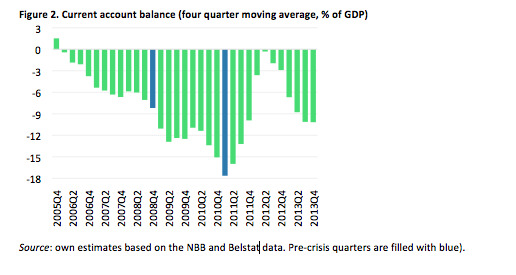Belarusian Drones, Military Cooperation with Ukraine, Drills – Belarus Security Digest

Photo: Belarusian drone
The situation around the establishment of a Russian air base in Belarus remains uncertain. Apparently, Minsk is continuing to bargain. In response, Moscow has postponed implementation of its earlier obligations to supply weapons to Belarus.
The Crimea crisis did not prevent cooperation between Belarus and Ukraine in either the military or industrial sphere: Ukrainian companies can participate in the modernisation projects of the Belarusian Air Force.
The Ministry of Internal Affairs continues to try and solve their staff shortage problems and improve the quality of its personnel, while the Belarusian military and industrial complex reaffirms its priorities with its pilot projects in the field of unmanned aircraft.
Some exercises have ended and others have started
The Armed Forces recently held the first phase of its joint staff training. The event has been scheduled to be held in two phases: the 1st phase will be held from 11-14 February and the 2nd phase will be held from 25-28 March. The main objective of the training is to develop the most suitable option for Belarus' Armed Forces, as well as other troops and military formations in accordance with the latest proposed simulated situation.
The event should be considered in conjunction with the operational readiness test of the Belarusian Armed Forces, which took place on 21 January to 10 February. The national military command pays a lot of attention to the organisation of a sustainable and efficient system of military command should a military conflict arise.
Minsk and Moscow continue to bargain on air force base and weapons supplies
Apparently, the situation around the creation of a Russian air force base in Belarus remains unclear. This can be deduced when considering the fact that there has been a postponement in the arrival of four battalions and delivery of the air defence missile systems (ADMS) S-300PS to Belarus.
If earlier they spoke about 2014, now the question is about 2015. On 20 February 2014, the Belarusian ambassador to Russia, Ihar Pietryshenka, said that a contract for a supply of four battalions and a command post of ADMS S-300PS from Russia had been discussed.
It was not entirely clear whether the supplies would be made in exchange for payment, or if they were going to be given to the Belarusian side. In April 2013, the Russian Minister of Defence, Sergei Shoigu said that the weapons would be transferred "as is". The Belarusian side would only pay for transport costs and equipment repairs. Perhaps, however, there were looming questions about the contracts for equipment repairs, namely if they should be carried out in Russia or not.
Since April 2011, when Russia first announced an agreement on supplying Belarus, they have repeatedly delayed their delivery. There is another unresolved issue as well – whether or not Belarus will need to purchase these new weapon supplies, albeit at a discounted price. Kazakhstan secured ADMS systems for free from Russia. The training of military personnel in Russia is provided to Astana at no cost.
Military and technical cooperation with Ukraine is growing
Despite the political crisis in Ukraine, cooperation in both the military and industrial spheres between the two countries is continuing to develop. The Cabinet of Ministers of Ukraine has granted permission to the Radar production plant (Kyiv) to export military goods to Belarus. This decision has been carried out, and is possible, due to the official "Agreement between the Cabinet of Ministers of Ukraine and the Government of the Republic of Belarus on the production and scientific and technical cooperation between the defence industry enterprises."
Despite the political crisis in Ukraine, cooperation in both the military and industrial spheres between the two countries is continuing to develop. Read more
The Radar production plant from Kyiv is one of the most advanced enterprises in Ukraine, which specialises in manufacturing modern radio electronic and radar equipment for aircraft and helicopters. Its products can be used to support the implementation of modernisation projects for MiG-29 and Su-27 fighters, as well as the Su-25 attack planes of the Belarusian Air Force.
The Interior Ministry is trying to solve the problem of staff shortages
There is some information emerging about the nature and results of the reforms that are taking shape in the Interior Ministry that was previously announced by the authorities. However, no fundamental changes have yet occurred. Some avacant posts were cut, some secondary services (such as physical training) were cut, and personnel were partially redistributed throughout the system which has been experiencing high workloads.
In order to stabilise the personnel situation, the ministry has intensified its vocational guidance for youth. In schools, there are 178 classes and 11 groups that concentrate on legal studies, comprising of more than four thousand students. The greatest concentration of students who are engaged in these profession-oriented studies are in the Brest and Homiel regions, as well in Minsk.
he period of initial training for future policemen has been increased to six months Read more
As a measure to improve the staffing of the Interior Ministry and the quality of the selection process, the period of initial training for future policemen has been increased to six months and the training programme includes more practical training.
The problem remains very acute. Thus, more than a quarter of posts in the transportion police in Minsk and the Minsk region remain vacant. The staffing situation is also unstable in the Homiel region.
Belarus develops projects to create domestic drones
This year, official tests are planned for Belarus' own drone, called the Burevestnik, which has been designed for aerial reconnaissance and surveillance. Its developer, the Physico-Technical Institute of the National Academy of Sciences, says that communication with the unmanned aerial vehicle (UAV) is guaranteed at a range of up to 290 kilometres.
In a pre-programmed stand-alone mode the flying range of the drone is over one thousand kilometres with it being able to stay in the air for up to 10 hours. The latter figure, it is expected, can be increased by still another 50%.
Statements about the drone's range and plans to hold official tests for the UAV Burevestnik this year may be overly optimistic, especially when judging from the experience of the development of the UAV Grif-1. Most likely, the project's schedule will be susceptible to shifts. The financial security of the project is also unclear.
The simultaneous nature of upgrading two UAVs (Burevestnik and Grif-1) suggests that they will be proceeding in more or less the same direction. Most likely, there are plans to use more composite materials their frames' construction and, most importantly, to install different engines.
Tactical use of UAVs are tested
Tactical exercises with the 1st reactive artillery battalion of the 1199th reactive artillery regiment took place in the Homiel region during 24-26 February. During the exercises, combat with the assistance of regular drone surveillance and using them during massive attacks to systematise firing was perfected. The accuracy of carrying out strikes at long range was also assessed.
This phase of the exercises, which combined the UAVs with traditional operational forces, focused on the application of multiple and single missile strikes on specific targets. It culminated in a multiple missile strike from an entire battalion, with each of its twelve combat vehicles firing sixteen rocket-propelled missiles.
Andrei Parotnikau
Andrei is the head of “Belarus Security Blog” analytical project.





